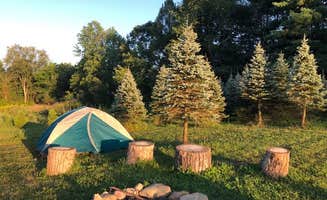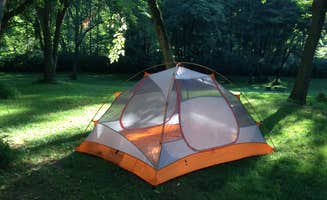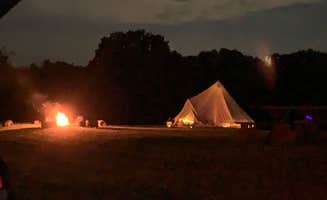Tent campsites near New Manchester, West Virginia offer primitive camping experiences with convenient access to regional trails and waterways. The area sits at the convergence of Ohio, Pennsylvania, and West Virginia state boundaries, creating diverse camping opportunities within short driving distances. Summer temperatures typically range from 60-85°F with higher humidity levels, while spring and fall camping provides more moderate conditions with occasional rainfall.
What to do
River recreation: At Quiet and Secluded in Pennsylvania, campers can access several water activities. "Beautiful place. Host was very accommodating. Great time," notes Tom J. The property offers direct routes to fishing spots and swimming areas not commonly advertised.
Biking excursions: The GAP Trail connects to several campgrounds where cyclists can rest between rides. "This campsite is a nice reward for west-bound riders on the GAP trail (it's the last one before Pittsburgh!), and a nice easy introduction to bikepacking camping for the east-bound," explains Shari G. The trail extends approximately 150 miles with camping options positioned every 15-25 miles.
Cannabis tourism: For adults seeking specialty farms, Laurel Highlands Hemp Cannabis Farm offers unique programming. "Friday nights are Toke With A Goat Yoga at 7 at the barn weather depending," according to Ashley F. The farm combines camping with cannabis education and structured activities for those interested in this legal agricultural product.
What campers like
Clean facilities: Tent sites with basic but well-maintained amenities receive consistent praise. "Clean bathroom. Office to charge electronics and a campsite with firepit was great. Nice and quiet here also," reports Frederick B. about his stay at Pioneer Trails Tree Farm Campground. Most sites provide maintained pit toilets within walking distance of tent areas.
Shower facilities: Higher-end tent camping options exist for those wanting more comfort. "The outdoor shower/toilet block is such a divine sight, it makes you crave one whether you're stinky or not," writes Shari G. about The GAP Trail Campground. These shower facilities typically operate seasonally, with most available from May through October.
Historical elements: Several tent camping areas incorporate local history into the experience. Lauren C. notes about camping near Dravo's Landing Campground, "It's close to an old cemetery which is useful in telling ghost stories around the campfire." Many sites in the region feature historical markers or remnants of industrial or agricultural structures that add educational value.
What you should know
Train noise: Campsites along rail corridors experience regular train disturbances. "The local volunteer group also keeps the free wood pile stocked and ready to go... but remember, with all this luxury comes an active train too... that's the nature of this trail. Bring those earplugs for a good night's sleep!" advises Shari G. Trains typically pass 4-6 times nightly along the GAP corridor.
Wildlife encounters: Food storage practices matter for tent campers in the region. "Just be sure to secure your food overnight - if you don't, the raccoons will make quick work of it!" warns Sarah Q. Most campgrounds do not provide bear boxes or hanging systems, so campers must bring appropriate food storage containers.
Limited availability: Some campgrounds operate seasonally or have reduced their offerings. Frederick B. discovered at Pioneer Trails Tree Farm that "I called the number listed and left a message. See the friendly manager walking the farm. He says they no longer offer the camping service due to low guest attendence." Always call ahead to confirm availability, especially at smaller family-run properties.
Tips for camping with families
Space considerations: When camping with larger groups, research sites that can accommodate multiple tents. "My family and I had a great time. It was very easy and relaxing. The trees were quite the entertaining experience for the kids," shares Andrew O. Many family-oriented sites limit occupancy to 4-6 people per site, requiring advance planning for larger groups.
Bathroom proximity: For families with young children, bathroom location matters. Andrew O. notes, "Only wish toilet access was a little closer for the women." Most primitive tent sites position toilet facilities 100-300 yards from campsites, which can be challenging for families with small children, especially at night.
Natural entertainment: The region offers outdoor learning opportunities without structured programming. "The trees were quite the entertaining experience for the kids," mentions Andrew O. Family-friendly sites often feature open spaces for games, shallow water access points, and naturally occurring features that engage children without requiring additional fees.
Tips from RVers
Tent-only restrictions: Several campgrounds cater exclusively to tent campers or cyclists. "Free bike-in camp site with water access along the Allegheny Gap trail," explains Lauren C. RV travelers seeking tent camping experiences should note that many sites have vehicle restrictions and may require parking at designated lots and walking gear to campsites.
Utility considerations: Even RV owners who occasionally tent camp should note the limited electrical access. "Rolled up on the later side but was welcomed kindly by the owner Bill. Beautiful spot. Clean amenities!" reports Clyde A. at Quiet and Secluded. While some properties offer electrical hookups near tent sites, most primitive options require self-sufficiency for lighting and device charging.




